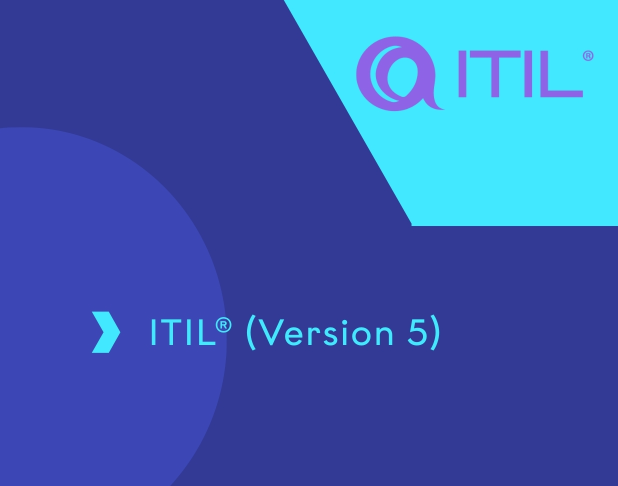ITIL helps you develop the knowledge to lead in today’s digital and AI-enabled world. The framework equips you with practical tools to improve collaboration, delivery and governance across the full digital lifecycle. It includes practical guidance on how to adopt and scale AI responsibly, and has been designed for use across an entire organisation, not just in IT service management. Choose ITIL to sharpen your professional edge and shape your career progression.
Valentines sale - up to 30% off training courses – use code: VALENTINES26NZ
ITIL® (Version 5) training
Build future-ready skills with ITIL, the globally recognised framework for managing digital products and services.


Why choose ITIL?
The new ITIL is more than an update – it’s a shift in how digital products and services are managed. It unifies product and service management into one clear lifecycle, enabling professionals to manage complexity with confidence.
For individuals, it offers a practical route to career progression with globally respected certifications that are aligned to real job roles. For businesses, ITIL provides a structured approach to delivering value, bridging strategy and operations, improving team collaboration, and supporting responsible innovation. It’s flexible, scalable, and built to help you stay competitive in a fast-changing environment.
- Learn to manage products and services as one lifecycle
- Gain recognition with globally respected certifications
- Build practical, role-aligned skills for digital delivery
- Improve cross-team collaboration and outcomes
- Support responsible, strategic use of AI
- Deliver better customer and employee experiences
- Align operations with business goals and governance
- Accelerate transformation and demonstrate measurable value
FAQs
ITIL provides practical guidance for managing digital products and services. It covers strategy, delivery, experience, governance and AI, helping individuals and organisations create consistent, measurable value across the full lifecycle.
What is the difference between ITIL 4 and ITIL (Version 5)?
ITIL (Version 5) builds on ITIL 4 by introducing a unified lifecycle for products and services, a stronger focus on digital experience, and AI-ready guidance. It offers clearer role alignment and more practical application, while protecting previous investments.
For a more detailed overview, take a look at our blog, Introducing ITIL® (Version 5): Everything you need to know about the new certification scheme
What does the new ITIL certification scheme look like?
The ITIL 5 certification scheme is structured around a clear, modular pathway. It starts with ITIL 5 Foundation, which introduces the core concepts and guiding principles. From there, learners can progress through practice-based and professional modules aligned to real-world service management roles.
Explore our blog for a practical breakdown of the ITIL 5 qualification framework and how certification pathways are structured.
If I already have an ITIL certification, do I need to do the Foundation certification in ITIL (Version 5) before doing the advanced certifications?
Not necessarily. If you have ITIL 4 Foundation or an advanced ITIL 4 certification, you can transition into ITIL (Version 5) modules without retaking Foundation. ITIL v3 professionals may be advised to start with the new Foundation course to cover updated content.
More information is available in our blogs:
Will ITIL (Version 5) help me manage the use of AI across my organisation?
Yes. The new ITIL includes an AI Governance module that provides a structured approach to adopting AI responsibly. It supports risk management, transparency and compliance, helping you align AI initiatives with strategic goals.
Why has the ITIL framework been updated?
The update reflects how organisations now work — digitally, collaboratively and at pace. ITIL (Version 5) responds to the growing use of AI, the integration of product and service management, and the need for measurable, outcome-driven change across teams.
Career development & support
ITIL provides new opportunities to ITIL professionals, whether you’re stepping into digital leadership, growing your capabilities in service delivery, or guiding transformation. Explore other ILX courses to continue your development.
There’s lots to consider when choosing a training course. We have a variety of study options, different payment methods, and optional extras such as exam resit services that you might want to add to your learning package. Our help centre has all the information you need to make the right choice. Plus, our helpful customer service team are always on hand to answer any questions.
Visit our help centre

"ILX has supported us to deliver a range of courses via both virtual training and eLearning. Their capability to deliver virtual sessions in many global time zones enabled us to be economical and train members of our team across the world."
Asma Khanam, Global Change Manager, Amazon
Do you prefer to learn at your own pace? Our interactive and engaging eLearning is the perfect self-study option, allowing you to move through resources and activities at a time that suits you.
Our in-person classroom courses provide an interactive and collaborative learning environment, where you will benefit from the knowledge and passion our trainers bring to the subject.
Our virtual courses provide the personal teaching experience of a classroom with the ease and flexibility of a virtual environment. All the benefits, without the travel!
Our blended courses combine eLearning with face-to-face training. Study the Foundation certification at your own pace and then use the Practitioner workshop to put the theory into practice.